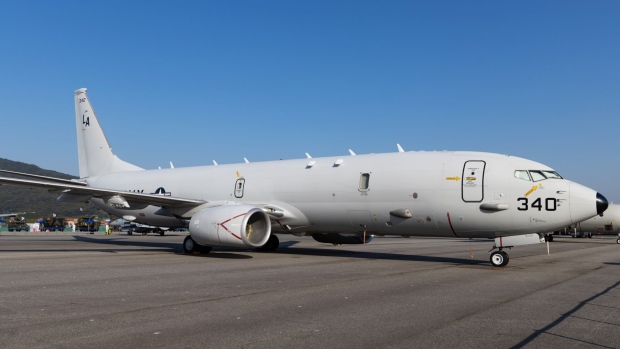Nov 30, 2023
Canada Set to Buy Boeing’s Sub-Hunting 737 in Snub to Bombardier
, Bloomberg News

(Bloomberg) -- Canada has finalized a deal to order as many as 16 military surveillance aircraft from Boeing Co. as part of a $7.7 billion investment, rejecting a homegrown rival proposed by private-jet manufacturer Bombardier Inc.
Prime Minister Justin Trudeau’s government confirmed the deal Thursday. Canada has entered into a “government-to-government” agreement with the US to acquire 14 Poseidon aircraft for the Royal Canadian Air Force, with options for an additional two.
The US State Department already approved the potential sale of the US Navy’s top sub-hunting aircraft, a modified Boeing 737 commercial jetliner called the P-8 Poseidon.
The contract with Boeing is about $4 billion and the company has committed to invest an equivalent amount in the Canadian economy, though the firm says in a news release it may invest more than $7.4 billion.
Canada’s overall investment includes as much as $5.9 billion for the planes, equipment, training devices and sustainment set-up. The rest of the money will cover funding for simulators, infrastructure and weapons, the Canadian government said in a news release.
“In our discussions with our NATO partners, there is increased concern about a much more aggressive approach undertaken by our potential adversaries,” including a more “threatening and lethal” persistent presence in the Arctic, said Defense Minister Bill Blair at a news conference Thursday.
“The world is becoming an increasingly dangerous place and therefore I’m very much seized with a sense of urgency.”
The new jets will replace Canada’s aging fleet of Lockheed Martin Corp. CP-140 Aurora aircraft at a time when Russia and China are showing increased interest in the Arctic region. The US has been pushing its close ally to upgrade the technology it is contributing to the North American Aerospace Defense Command, especially after an alleged Chinese spy balloon traveled over both nations before being shot down in February.
Trudeau’s government had previously expressed a preference for the Boeing plane, which is already deployed by Germany, Norway, South Korea, Australia and New Zealand. The deal would be among the largest of its kind for the US planemaker.
The P-8 Poseidon faced a late challenge from Montreal-based Bombardier, with Chief Executive Officer Eric Martel calling for an open and “fair” procurement process as he tries to jump start a new defense business.
Martel touted over the past months a militarized version of Bombardier’s Global 6500 business jet as a “made-in-Canada solution” that would showcase Canada’s defense innovation. The firm partnered with General Dynamics Corp. in May to develop the aircraft’s military equipment.
However, the proposed model exists only on paper, a factor that adds to the risk of delays or other new-aircraft pitfalls on a project important to national security.
Bombardier shared its disappointment about the announcement in an emailed statement. “The solution we were ready to present would have been a game changer for the Canadian economy,” the company said.
“It wasn’t a choice between this airplane and another because there is no other available at the present time,” Blair said. That the Poseidon is used by Canada’s allies and met all the requirements laid out by the Air Force made it “not only the right choice, but frankly the only choice,” he said.
To sweeten the deal, Boeing will make targeted investments in Canadian industry to support the growth of the country’s aerospace and defense sector, the government said in the release. It said the investments have the potential to generate more than 3,000 jobs annually, benefit hundreds of Canadian companies and contribute at least $264 million annually to Canada’s gross domestic product over 10 years.
Boeing said in a release that it would establish an aerospace development center in Montreal that would host research and development focused on decarbonization, electrification, autonomy, digitalization and advanced materials. It will also create partnerships with Canadian universities.
“There’s no doubt the P-8 will protect Canada’s oceans and its borders for future generations,” said Charles “Duff” Sullivan, managing director of Boeing Canada, in the release.
The first P-8A aircraft is expected to be delivered in 2026, with an average of one plane delivered per month the order is complete, as early as fall 2027. Full operational capability is expected by 2033.
The Aurora fleet was originally procured in 1980 and is scheduled to retire from service in 2030.
--With assistance from Julie Johnsson.
(Adds details on contract, quotes from news conference throughout.)
©2023 Bloomberg L.P.


